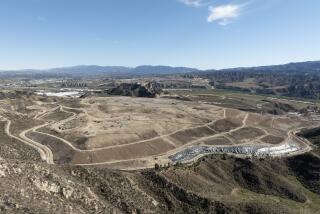Raising a Stink Pays Off for Residents of Fallbrook
- Share via
Finally, says one resident of the tidy Cerrita Vista housing development in Fallbrook, he will be able to walk outside his custom home and take a big whiff--without risk of gagging from the malodorous breezes that sometimes waft from the nearby sewage-treatment plant.
“We won’t be known as ‘compost’ or ‘sewage hill’ anymore,” Gordon von Voelker said.
His relief came Thursday when the hearing board of the county Air Pollution Control District voted in effect to shut down the culprit: a composting facility at the Fallbrook sewage-treatment plant.
The board’s decision to deny the Fallbrook Sanitary District a temporary variance to operate the compost facility, equipment for which the APCD says needs an operating permit, stems from a barrage of complaints from Cerrita Vista residents.
Homeowners in the community say the “stench” from the neighboring treatment plant has trapped them in their homes for years, and they have fought vehemently to close their city’s award-winning, worm-driven composting facility. Residents fear property values have plummeted because of the odors.
APCD investigators say they have verified the residents’ complaint--the compost stinks, bad.
“It’s so bad in the summer that you can’t have a barbecue or enjoy the pool,” von Voelker complained. “This composting operation started out as a pilot program that didn’t bother too many people. Then it just grew and the smell got worse and worse and the (sanitation district) didn’t do anything about it.”
Behind the sanitary district’s gates, not 40 paces from Cerrita Vista, solid residue from waste-water treatment was fed to thousands and thousands of worms, which eat half their body weight’s worth of the scum every day.
The worms’ digestive systems convert it to a prize-winning fertilizer that is sold under the trademark Vermigro, which experts say is excellent. It can be used for everything from rose bushes to citrus trees and avocado trees to shrubs. The compost operation, which cuts sewer bills for the district’s 17,000 customers, rakes in about $84,000 annually for processing Capistrano Beach’s sludge and about $57,000 from Vermigro sales.
But APCD investigators have determined that the sewage district needs an APCD operating permit for some gas-powered machinery at the composting plant. The district hasn’t granted an application for the permit yet, and may not grant the permit because of the odor complaints, according to an APCD spokesman. The sanitary district needed the temporary variance that the APCD hearing board considered Thursday to continue operation without that permit.
Sanitation district general manager Ben Price said that efforts have been made to reduce the odors from the compost, and that part of what residents had been complaining about was the stench of raw sewage from their sewers. That problem, he said, has been reduced by adding a chemical to the sewers. Also, compost is no longer being stockpiled at the facility.
The compost facility, Price said, stopped accepting raw sewage on Thursday and sludge will now be “de-watered” and then trucked to a farm in Thermal, just northwest of the Salton Sea. To continue doing that will cost the sanitation district as much as $205,000 annually, Price said. By comparison, he said, the compost facility cost about $100,000 to operate in 1991 and showed a positive cash flow of about $2,500 during the first four months of this year.
Price doesn’t think it’s a “stench” emanating from the compost facility. He calls it an “odor,” and does not consider it something that can be construed as a serious problem for nearby residents.
“Composting has an agriculture smell,” he said. “We’ve changed the smell here from an obnoxious one of sludge drying beds to one of agriculture.”
Now, he said, the sanitation district has three choices: find a way to meet the APCD’s requirements for continued operation, truck the sludge to a landfill or start up a new composting facility elsewhere--something he figures would take three years to situate and obtain permits for.
More to Read
Sign up for Essential California
The most important California stories and recommendations in your inbox every morning.
You may occasionally receive promotional content from the Los Angeles Times.










